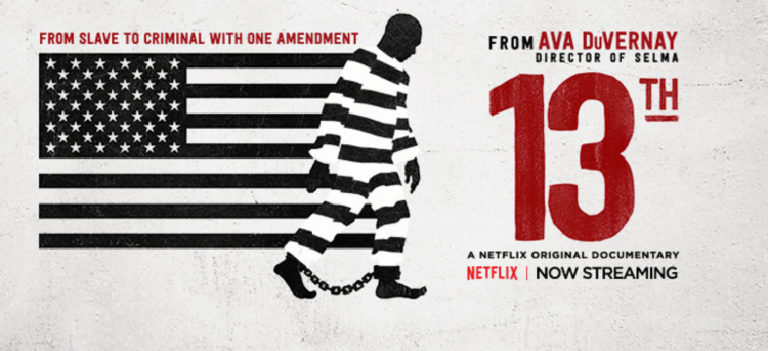
By Diane Walder
Remember that old song “Wonderful World” by Sam Cooke that begins “Don’t know much about history…?” That’s probably true for most Americans — especially those of us who have only recently become aware that slavery never ended. The U.S. Constitution’s 13th amendment, signed by Abraham Lincoln February 1, 1865, might have had a chance of ending slavery except for that sly little clause between the commas: “Neither slavery nor involuntary servitude, except as a punishment for crime whereof the party shall have been duly convicted, shall exist within the United States.”
A few dozen people gathered at the Lakeview Library in early July to view a documentary titled 13th which explores the mass incarceration of black men. The screening was sponsored by the Northside Planning Council’s (NPC) Community Capacity-Building Committee. According to NPC executive director Abha Thakkar, the committee’s goal in hosting the viewing was to “create awareness and jumpstart conversations around racial justice.” Not a bad idea, given the Northside’s tremendous diversity.
The opportunity to see 13th was a good beginning and an excellent, albeit, shocking, history lesson. Through historical footage, interviews and other sources, the film shows how a strategic campaign to equate “blackness” with “criminality” has led to mass incarceration and builds a devastating and condemning case against the government and private enterprise, which have profited from the forced labor of imprisoned African-Americans. The film points out that the American Legislative Exchange Council (ALEC) has partnered with the Corrections Corporation of America, which benefits from sentencing laws such as mandatory minimums that increase the company’s prison business, laws that ALEC has advocated for in the past. The film makes the case that privatized prisons have become the new plantation, in which the unpaid labor of black men produces goods for others to profit from.
The statistics are telling: 513,000 imprisoned people in 1970 to 2.3 million today; one in three black men will go to prison in their lifetime.
This film clearly made an impact on the audience. In a discussion after the film, some people were in tears, others reported feeling physically ill. It was a catalyst for action. But what sort of action?
13th was the “jumpstart” that NPC hoped for. “We have to help our community think about what role it can play. We have to work at every scale, but in the end we have to build relationships at a very local level and overcome the challenges in our own backyard or we won’t make progress on a larger scale,” Thakkar said.
Thakkar says the committee plans to organize more community events—presenting other documentaries, book groups and individual speakers — to give people a better foundation of knowledge on these issues and on strategies to work towards racial justice and economic equity.
Recommended books for further reading: Devil in the Grove: Thurgood Marshall, the Groveland Boys, and the Dawn of America by Gilbert King; Between the World and Me by Ta-Nehisi Coates; Just Mercy by Bryan Stevenson; The New Jim Crow by Michelle Alexander.